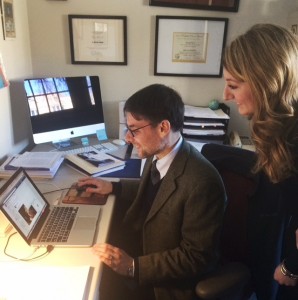The St. Thomas theology department is introducing the Institute for Catholicism and Citizenship this spring for students, faculty and the surrounding community.
Massimo Faggioli, theology professor and director of the ICC, said the main purpose of the institute is to offer the study of Catholicism to all students on campus.

“We want to create initiatives that are not only for theologians but interest a wider audience,” he said.
According to Faggioli, the ICC’s mission is to promote civil discourse, faithful citizenship and the common good by fostering theological insight and interdisciplinary inquiry into economic, political and social views.
The ICC will spread lessons of Catholicism and how it affects social, economic and political concepts through a series of lectures and seminars held on campus, and anyone is welcome to participate.
Sophomore Tasha Johnson, vice president of the Theology Club, said she thinks the institute is a great idea and that everyone can benefit from learning about theology.
“There are so many wonderful professors and topics to be studied, but most of us just take (theology classes) as a requirement. So if there were more going on, it could be really interesting, and a lot more students would have the opportunity to get involved,” Johnson said.
Faggioli said one of the great things about opening programs in theology to the public is getting a new perspective on topics about Catholicism.
“We want to hear multiple voices. We want to be multi-partisan,” Faggioli said. “There’s a lot that (theologians) don’t talk about because we don’t like to disagree, but healthy disagreement is a part of our civil society. We think that, on a Catholic campus, this practice should be a part of our way to address important issues.”
Johnson said she would recommend these programs to her friends outside of the theology and Catholic studies departments. She added that while many students aren’t particularly interested in theology, everyone should give it a try.
Faggioli has a goal to make the St. Thomas campus a worldwide meeting place for theologians and those interested in theology and Catholicism. He said he thinks the integration of citizens inside and outside of the professional theology circle will benefit everyone.
Johnson agreed that people willing to listen about Catholicism can benefit and learn, even if they don’t come to an agreement in the end.
“Whether you agree with it or not, I think it’s important to go out there and see what there is,” Johnson said. “A teacher of mine once said you need to be ‘intellectually curious.’ In the end you don’t have to believe in anything, but in order to find out, you need to go out and learn.”
The ICC has four scheduled events at St. Thomas starting in April. The institute’s website will launch March 9 and provide information on the program and how to get involved.
Lauren Andrego can be reached at andr0090@stthomas.edu.

